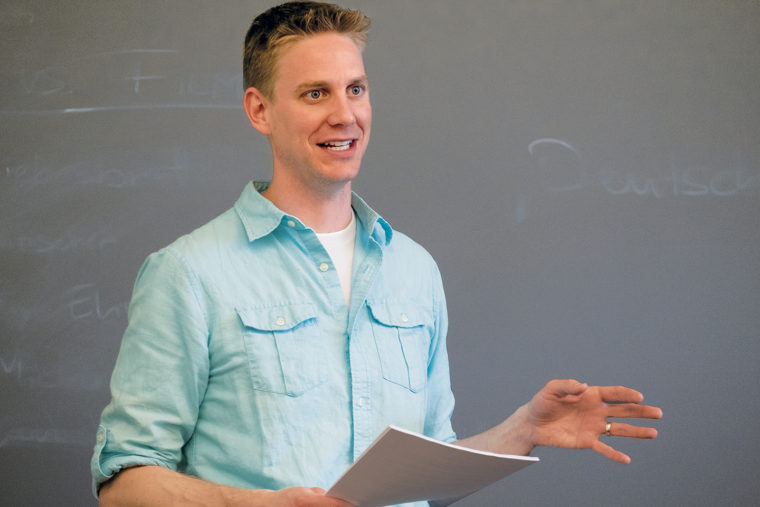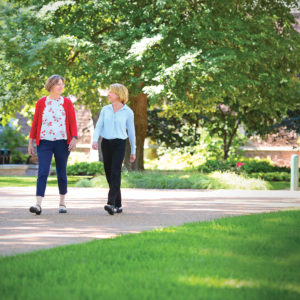What makes America, well, America?
This is a question that Abram Van Engen, associate professor of English in Arts & Sciences and affiliated faculty member with the Danforth Center on Religion and Politics, sets out to answer in his course “City on a Hill: The Concept and Culture of American Exceptionalism.”
The course looks at the history of American exceptionalism, which is the idea that America is specially chosen or has a unique mission in the world. It may seem like a narrow focus, but analyzing American exceptionalism touches on how we tell our historical narratives, how we define American identity and how we shape our politics and policy.
Van Engen developed the idea for the course after finishing his first book, Sympathetic Puritans: Calvinist Fellow Feeling in Early New England, which included a chapter about John Winthrop’s lay sermon “A Model of Christian Charity,” often considered the urtext of American exceptionalism. Supposedly given onboard the Arabella in 1630, Winthrop exhorts his fellow passengers to be exemplary Christians as they work together to build what would become the Massachusetts Bay Colony: “Wee must Consider that wee shall be as a Citty upon a Hill, the eies of all people are upon us.”
“I found a lot of interesting details about the sermon and the way it worked its way into American consciousness and American exceptionalism,” Van Engen says.
Politicians like John F. Kennedy, Michael Dukakis, Bill Clinton and Ronald Reagan have all directly quoted “A Model of Christian Charity.” The class reads those speeches and other political texts, such as George W. Bush’s speech about 9/11 (Sept. 20, 2001) and Newt Gingrich’s A Nation Like No Other (2011).
But beyond speeches and sermons, the class also examines how American exceptionalism more broadly works its way into our historical narrative. “Exceptionalism is not just a comparative claim about America’s relation to other countries in the world,” Van Engen says, “but also a historical claim about the way America came into being.” An American history that starts with the Puritans, for example, may claim that America began with the pursuit of religious freedoms, which made it exceptional. One that starts with Native Americans, however, might be an anti-exceptionalist history about America’s brutal land grab. (Anti-exceptionalism claims either that America is not exceptional compared to other countries or that it is exceptionally bad.)
Seth Akakpo-Lapo, Arts & Sciences Class of 2019 (psychology), was interested in a different aspect of American exceptionalism. “My family is from West Africa, and we moved here when I was 9 years old,” Akakpo-Lapo says. “So I have a desire to learn about American idealism, from its past roots to its current effects on national and international dynamics in order to help inform my identity as a new American.” Students look at texts like the preface to Walt Whitman’s Leaves of Grass (1855), Frederick Douglass’ What to the Slave Is the Fourth of July? (1852) and Michael Walzer’s What Does It Mean to Be an ‘American’ (1990) in order to see how even American identity can be shaped by exceptionalism.
One key idea of the course is that American exceptionalism has changed over time, and it will change again. The overarching idea that America has a mission in the world remains the same, but it’s “fairly without content,” Van Engen says. “What makes America special, what it is that [people are] supposed to be delivering as Americans, can shift from one era to another.”
Taylor Reynolds, Arts & Sciences Class of 2017 (history), entered the class “ambivalent” about exceptionalism and left with a more nuanced understanding of the concept’s power. “To some extent, every nation has to believe it’s exceptional in order to do great things,” he says. “But is it a fantasy or a grasping of reality? That is, by believing in your exceptionalism, to what extent do you make it true?”
— Rosalind Early, AB ’03, is associate editor of this magazine.


Comments and respectful dialogue are encouraged, but content will be moderated. Please, no personal attacks, obscenity or profanity, selling of commercial products, or endorsements of political candidates or positions. We reserve the right to remove any inappropriate comments. We also cannot address individual medical concerns or provide medical advice in this forum.